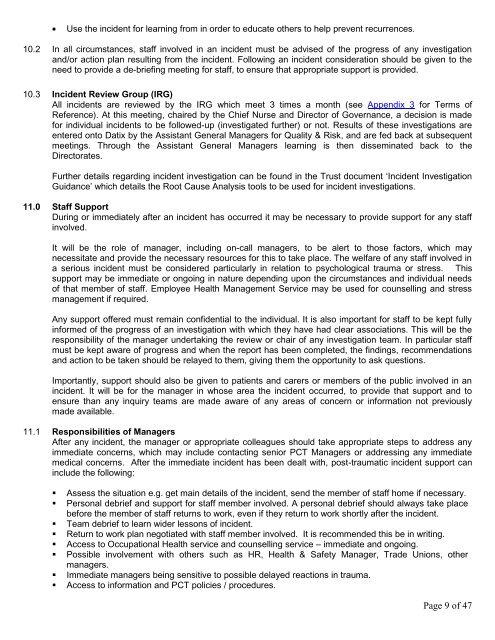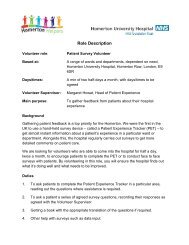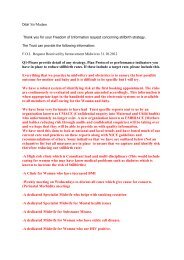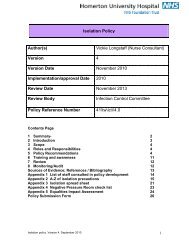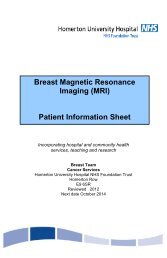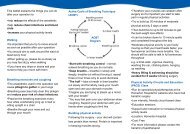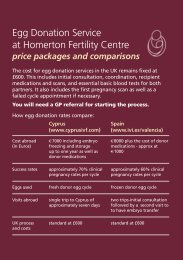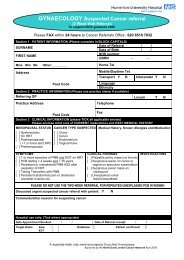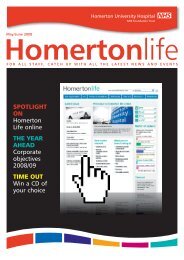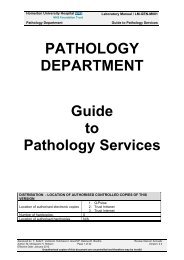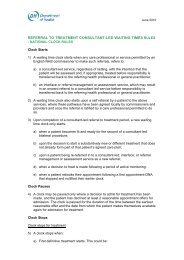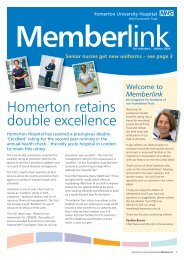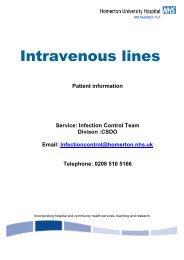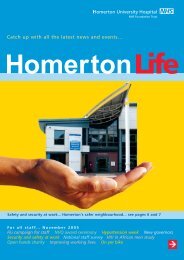Incident reporting policy - Homerton University Hospital
Incident reporting policy - Homerton University Hospital
Incident reporting policy - Homerton University Hospital
You also want an ePaper? Increase the reach of your titles
YUMPU automatically turns print PDFs into web optimized ePapers that Google loves.
Use the incident for learning from in order to educate others to help prevent recurrences.10.2 In all circumstances, staff involved in an incident must be advised of the progress of any investigationand/or action plan resulting from the incident. Following an incident consideration should be given to theneed to provide a de-briefing meeting for staff, to ensure that appropriate support is provided.10.3 <strong>Incident</strong> Review Group (IRG)All incidents are reviewed by the IRG which meet 3 times a month (see Appendix 3 for Terms ofReference). At this meeting, chaired by the Chief Nurse and Director of Governance, a decision is madefor individual incidents to be followed-up (investigated further) or not. Results of these investigations areentered onto Datix by the Assistant General Managers for Quality & Risk, and are fed back at subsequentmeetings. Through the Assistant General Managers learning is then disseminated back to theDirectorates.Further details regarding incident investigation can be found in the Trust document „<strong>Incident</strong> InvestigationGuidance‟ which details the Root Cause Analysis tools to be used for incident investigations.11.0 Staff SupportDuring or immediately after an incident has occurred it may be necessary to provide support for any staffinvolved.It will be the role of manager, including on-call managers, to be alert to those factors, which maynecessitate and provide the necessary resources for this to take place. The welfare of any staff involved ina serious incident must be considered particularly in relation to psychological trauma or stress. Thissupport may be immediate or ongoing in nature depending upon the circumstances and individual needsof that member of staff. Employee Health Management Service may be used for counselling and stressmanagement if required.Any support offered must remain confidential to the individual. It is also important for staff to be kept fullyinformed of the progress of an investigation with which they have had clear associations. This will be theresponsibility of the manager undertaking the review or chair of any investigation team. In particular staffmust be kept aware of progress and when the report has been completed, the findings, recommendationsand action to be taken should be relayed to them, giving them the opportunity to ask questions.Importantly, support should also be given to patients and carers or members of the public involved in anincident. It will be for the manager in whose area the incident occurred, to provide that support and toensure than any inquiry teams are made aware of any areas of concern or information not previouslymade available.11.1 Responsibilities of ManagersAfter any incident, the manager or appropriate colleagues should take appropriate steps to address anyimmediate concerns, which may include contacting senior PCT Managers or addressing any immediatemedical concerns. After the immediate incident has been dealt with, post-traumatic incident support caninclude the following:• Assess the situation e.g. get main details of the incident, send the member of staff home if necessary.• Personal debrief and support for staff member involved. A personal debrief should always take placebefore the member of staff returns to work, even if they return to work shortly after the incident.• Team debrief to learn wider lessons of incident.• Return to work plan negotiated with staff member involved. It is recommended this be in writing.• Access to Occupational Health service and counselling service – immediate and ongoing.• Possible involvement with others such as HR, Health & Safety Manager, Trade Unions, othermanagers.• Immediate managers being sensitive to possible delayed reactions in trauma.• Access to information and PCT policies / procedures.Page 9 of 47


